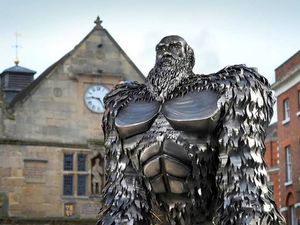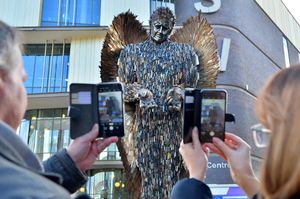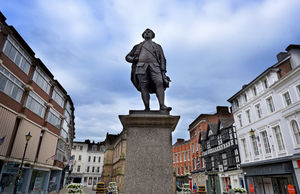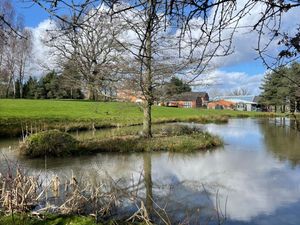Charles Darwin sculpture offered to Shrewsbury after calls for Knife Angel to replace Clive of India statue
Sculptures of Charles Darwin and Shropshire's Woolly Mammoth have been offered free of charge to Shrewsbury, after calls for the Knife Angel statue to permanently replace the Clive of India statue were made.

The British Ironwork Centre in Oswestry, home of the sculpture, says it has been approached by several members of the public and the county's business community over the possibility of homing the Angel, who feel that Robert Clive's statue in The Square no longer accurately reflects or celebrates attributes that are admired in today's society.
Clive played a major role in establishing British power over India and became wealthy by looting its resources. He was part of the East India Company, and many of its policies have been said to have caused the famine of Bengal that lasted between 1769 and 1773, killing around a third of the region's population.
See also:
The Ironworks has said the Angel is unavailable due to its national tour, with many towns and cities keen to display it, but they have offered a sculpture of Charles Darwin and Shropshire's Woolly Mammoth.
A spokesperson from the Ironworks said: “It’s impossible to offer Shrewsbury the Angel as its National Anti-Violence Tour, which aims to raise awareness all across the UK, will hopefully restart as soon as the current disruption subsides.
"There is still a large volume of cities and towns wishing to host the Angel and embrace the 30-days of anti-violence education programmes that have been implemented already throughout eleven UK cities and towns to date. The latest locations wishing to be included within the tour are Leeds and towns in Lancashire such as Blackburn and possibly Burnley.”
Clive Knowles from the Ironworks has said: “We always wish to support Shrewsbury in undertaking any changes that the people of Shrewsbury wish to make.

"As the Angel isn’t available, we’ve offered our sculpture of Charles Darwin, as seen within this artists impression, and our latest creation, “The Shropshire Woolly Mammoth” sculpture. Both sculptures have been offered at no cost to Shrewsbury. It is obviously a great honour to have our work featured in Shrewsbury however, we want to ensure that the public are thoroughly consulted and that their communal wishes are met before any changes are made.”
More than 20,000 people have signed petitions to get rid of the statue, while a rival petition to save it has gained more than 6,700 signatures.
The statue has been subject of heated debate for the last week since historical monuments which are considered to have connections to racism and violence became the target of campaigners. It came after the death of black man George Floyd, who was killed after having his neck crushed under the knee of a white police officer in the US, triggered an outpouring of support for the Black Lives Matter movement.
A petition has also been launched to get another statue of Clive torn down in Whitehall, Westminster. It has more than 500 signatures so far.
In brief: Who was Robert Clive?

Clive was born on the Styche Hall estate, near Market Drayton, in 1725 and went to school in London before travelling to India with the East India Company in 1743.
After two years in Britain, in 1755 Clive returned to India and two years later retook Calcutta (now Kolkata) for the company at the Battle of Plassey, a key moment on Britain's path to controlling Bengal and then India for almost two centuries.
Corruption and looting saw Clive amass a huge amount of wealth and he returned to Britain in 1760, aged 34.
He was made Baron Clive of Passey, knighted and became Shrewsbury's MP, a position he held until his death.
He went back to India in 1765 for two years before returning to Britain where the activities of Clive and the East India Company in India came under sustained attack.
The famine of Bengal that lasted between 1769 and 1773 and killed around a third of the region's population was said to have largely been caused by the company's policies.
Clive defended himself in Parliament, saying "I stand astonished at my own moderation," and in 1773 Parliament declared that he did “render great and meritorious services to his country.”
He died at home in London aged 49 and is believed to have killed himself.
All the petitions can be found by searching ‘Clive of India’ on change.org.





